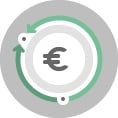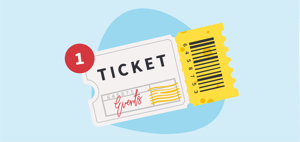Nowadays, the mailboxes of professionals in all industries are flooded with invitations for (free) events. Many of them are prone to register and ‘see if they can make it’, when the time comes. Result: high no-show rates and a disappointing event ROI. In this blog - we will explain how to obtain a higher ROI on your events, by asking a (small) fee for your event tickets.

Live events remain popular
Event marketing took flight when, 20 years ago, the experience economy started to emerge. Marketing and event professionals discovered the power of bringing your target audience together in a physical space. Nowadays, events are booming business - and used more frequently. The average number of events in Dutch companies is 23 (!) events per year (High Profile Locations), the majority is free of charge. This might look like a positive development, but is that really the case? ‘Free’ events are never really free: organising an event means investing time, money and energy. Here are 3 reasons why a (small) attendance fee can result in a better event.
1. Lower your event no-show
High no-show percentages are every event professional’s worst nightmare. Low attendance rates often cause disappointment among the attendees. After all, many take the audience into consideration when deciding to visit an event. The costs per attendee increase with the no-show rate, since you calculate your hosting and catering based on the number of attendees. Asking a small fee may offer a simple solution. When invitees are requested to pay a registration fee, they are more prone to make a conscious decision. Therefore, the probability that they will actually attend, increases.
TIP: Another important element is the cancellation button in your email invitation. Although your do not want to encourage your invitees to cancel, it is important to give them the opportunity to do so.
2. Improve the quality of your program
Organising many low-budget events might seem efficient. However, low-budgets often result in low-quality programs. Think about it: inspiring speakers, a nice location and professional catering are costly. However, they do add value to your event! If you sell tickets to your event, the generated revenue can be used to book good speakers and create strong content. Your invitees will be more inclined to register for (and actually attend) an event that features an interesting keynote.
3. Attract the right audience
The event objectives should be determined before the event. For instance: generating leads, improving customer relations or attracting influencers. Paid events attract a different audience as compared to free events. ‘Shoppers’ that are mainly interested in (free) lunches and handing out business cards will be less tempted to register for your event, when an entrance fee is demanded. Getting in the right audience will directly influence your event ROI.
Some events will always be ‘free’
The transition from free to paid events is not applicable to all event types. It goes without saying that internal employee and networking events will always remain of charge. However: never stop looking critically at these events. What is the added value? How is the ROI measured? If this is not clear, ask yourself what the motivation is to organise this event.
Conclusion
Don’t be afraid to (quite literally) add value to your events, by asking your visitors to pay an entrance fee. On the long run, your events have more effect when they are visited by the right audience. Also, your organisation will benefit from customers that are satisfied with the program content and quality. This will result in a higher ROI.
Insight Sessions
Momice regularly organises Insight Sessions. Following successful editions earlier this year on the new privacy legislation GDPR, event ROI and event tickets. Soon we will organise a new session, so stay tuned!


